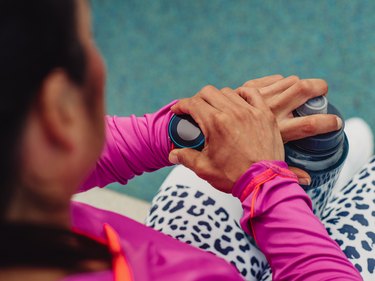
One specific liquid diet for weight loss doesn't exist. However, variations of this very-low-calorie diet have you subsist on juice, clinically prepared nutritional drinks, smoothies or concoctions of cayenne pepper and lemon juice for days, weeks or even months.
While a liquid diet is sometimes medically necessary — to jumpstart weight loss and prep the body before bariatric surgery, for example — it should only be done under the supervision of a doctor. You should never attempt a liquid diet for quick weight loss on your own, as it can put you at risk for nutritional deficiencies and more serious health problems.
Video of the Day
Video of the Day
Here's a look at what's included in a liquid diet, along with the risks and side effects you should know about.
What Is a Liquid Diet?
A liquid diet involves replacing all whole, solid food with juice, smoothies, soups, frozen bars or a combination of any or all of these products. A liquid diet usually results in quick weight loss because you restrict calories severely when you cut out whole foods, per the National Library of Medicine (NLM), but it should not be used for this purpose.
Rather, a doctor may prescribe a liquid diet before a medical test, procedure or surgery, such as bariatric surgery, or as part of the recovery process after certain surgeries involving the digestive system.
A liquid diet typically includes more foods than a clear liquid diet, and it can help you transition from clear liquids to a regular diet when recovering from certain surgeries or procedures, per the NLM and Mayo Clinic.
Some foods commonly included in a liquid diet are:
- Water
- Fruit juice, including those with pulp
- Soda
- Plain ice cream, sherbet and frozen yogurt
- Soup broths or strained creamy soups
- Tea or coffee (with cream, milk, sugar and/or honey)
- Jell-O
- Pudding and custard
- Popsicles
- Broth
- Liquid supplements (like Ensure or Boost)
Do Liquid Diets Work for Weight Loss?
In cases of extreme obesity, a physician may prescribe a very-low-calorie liquid diet (400 to 800 calories per day) to help a person shed pounds quickly. This is meant to either prevent an immediate medical consequence resulting from excess weight or prepare a person for bariatric surgery.
People on a liquid diet typically lose 3 or more pounds per week, but they are followed closely by their doctor to make sure no complications arise, according to a 2018 article in Practical Guide to Obesity Medicine.
Many non-medical versions of liquid diets exist, too. To lose weight quickly, proponents of liquid diets (sometimes called "detox diets") require you to stick primarily to vegetable juices or low-sugar liquids and avoid solid food, according to the NLM.
Other liquid diets may have you sip broth or smoothies instead of eating vegetables, fruits, lean protein and whole grains. These diets aren't usually developed by a dietitian or doctor, but simply reduce your calorie intake so you lose weight.
While you may see quick results from a diet like this, the effects are only temporary, and in most cases the potential health risks far outweigh any changes you may see on the scale.
Risks and Side Effects of Liquid Diets
Whether you're following a juice fast that's promoted as "cleansing" or a liquid diet that promises to help you drop 10 pounds quickly, you're essentially starving your body and denying it the whole foods it needs to survive and thrive.
A juice fast risks overloading your body with carbohydrates and sugar while forcing it to burn your muscle mass for energy. You may lose weight quickly if you subsist on juice alone, but your metabolism will ultimately slow down, and you risk nutritional deficiencies, loss of energy, muscle loss and nausea, according to Houston Methodist Hospital.
Even medically supervised very-low-calorie liquid diets can have serious consequences. Followers may develop liver inflammation, abdominal discomfort, diminished immunity, muscle loss, nutrient deficiencies, bad breath, headaches, dehydration, severe fatigue, gallstones and kidney stones, per the U.S. Department of Health and Human Services.
Most people do not need to follow a very low-calorie diet and should follow a whole foods diet to lose weight, per the U.K.'s National Health Service (NHS).
Liquid diets also fail to teach you how to craft meals that will support any weight loss in the long term. At some point, you'll start to eat whole foods again; if you don't have good, healthy habits in place, you could end up regaining any lost weight and possibly more when you return to old ways of eating, according to the Cleveland Clinic.
The Bottom Line
While a liquid diet can cause you to lose weight rapidly, it is not a good idea for most people when it comes to sustainable and healthy weight loss. In the end, it could do more harm than good, causing nutritional deficiencies, fatigue, malnourishment and more.
Don't start a liquid diet or juice cleanse unless it's recommended by your doctor for an underlying health condition or to lose weight prior to weight-loss surgery. People who are pregnant, breastfeeding, take insulin for diabetes, older adults, children or anyone with a chronic illness should especially avoid trying a juice cleanse or liquid diet, per the NHS.
If a liquid diet is recommended by your doctor, meet with a dietitian who can ensure you are getting proper nutrients and direct you to supplement brands if needed.
- National Library of Medicine: "Full Liquid Diet"
- Mayo Clinic: "Clear Liquid Diet"
- Practical Guide to Obesity Medicine: "Chapter 24 - New Approach to Type 2 Diabetes Reversal in Obesity: Acute Calorie Restriction"
- Houston Methodist Hospital: "Are Juice Cleanses Actually Good for You?"
- NHS: "Very low calorie diets"
- Cleveland Clinic: "Why People Diet, Lose Weight and Gain It All Back"


